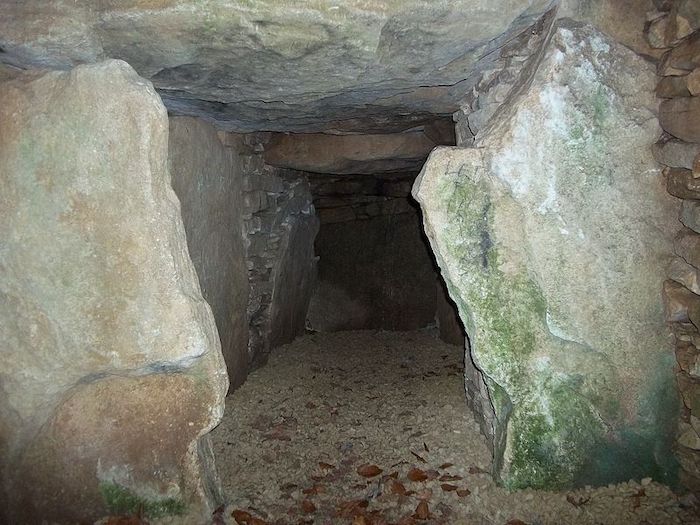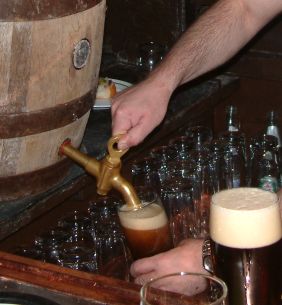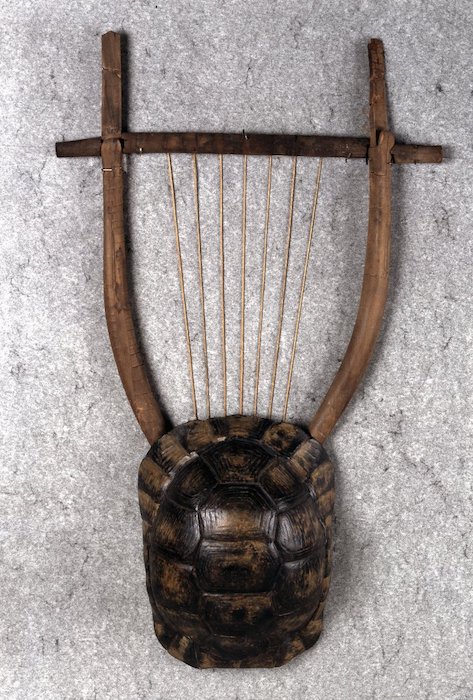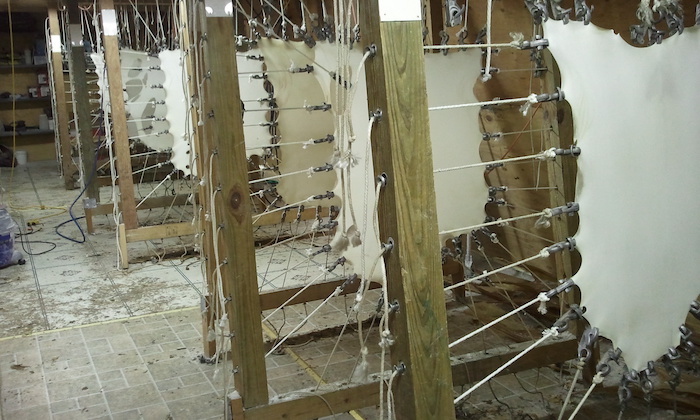Exeter Riddle 28
MEGANCAVELL
Date: Tue 09 Sep 2014Matching Commentaries: Commentary for Exeter Riddle 28
Biþ foldan dæl fægre gegierwed
mid þy heardestan ond mid þy scearpestan
ond mid þy grymmestan gumena gestreona,
corfen, sworfen, cyrred, þyrred,
5 bunden, wunden, blæced, wæced,
frætwed, geatwed, feorran læded
to durum dryhta. Dream bið in innan
cwicra wihta, clengeð, lengeð,
þara þe ær lifgende longe hwile
10 wilna bruceð ond no wið spriceð,
ond þonne æfter deaþe deman onginneð,
meldan mislice. Micel is to hycganne
wisfæstum menn, hwæt seo wiht sy.
A portion of the earth is garnished beautifully
with the hardest and sharpest
and fiercest of treasures of men,
cut, filed, turned, dried,
5 bound, wound, bleached, weakened,
adorned, equipped, led far
to the doors of men. The joy of living beings
is within it, it remains, it lasts,
that which, while alive, enjoys itself
10 for a long time and does not speak against their wishes,
and then, after death, it begins to praise,
to declare in various ways. Great is it to think,
for wisdom-fast men, [to say] what the creature is.
Notes:
This riddle appears on folio 107v of The Exeter Book.
The above Old English text is based on this edition: Elliott van Kirk Dobbie and George Philip Krapp, eds, The Exeter Book, Anglo-Saxon Poetic Records 3 (New York: Columbia University Press, 1936), pages 194-5.
Note that this edition numbers the text Riddle 26: Craig Williamson, ed., The Old English Riddles of the Exeter Book (Chapel Hill: University of North Carolina Press, 1977), page 84.
Tags: anglo saxon exeter book riddles old english solutions riddle 28
Related Posts:
Exeter Riddle 13
Exeter Riddle 26
Exeter Riddle 39




Commentary for Exeter Riddle 27
MEGANCAVELL
Date: Tue 02 Sep 2014Matching Riddle: Exeter Riddle 27
Here’s Wendy Hennequin‘s follow-up to her translation:
The general consensus about Riddle 27 is that the solution is “mead” (Tupper Jr., page 132; Rodrigues, page 131; Niles, page 135). Tupper and Rodrigues note that whip and sleep have also been proposed (pages 132; 131). Niles has recently proposed a double solution: “nectar (honey-dew) and mead” to account for both the first part of the poem regarding the origins of honey and the second part of the riddle, which describes mead’s effects (pages 135-36). Certainly, Niles is correct in identifying two parts of the riddle—a sort of “before and after.” At first, the mysterious object is found everywhere: mountains, valleys, woods, and cities. Then, afterwards, the object fells men. The transition between these two stages is the bath in a barrel (or bucket). The other proposed solutions, whip and sleep, do not account for that transition.
Here’s a picture of some home-brewed honey-fruit mead. Photo (by Evan-Amos) from Wikimedia Commons.
Except for Niles’ very brief discussion of word play in Riddle 27 (pages 135-36), I have not found any critical discussion of Riddle 27. Only a few of the Exeter Book Riddles have been examined extensively beyond the search for their solutions and their relationships to other riddles, Latin or Old Norse. [editorial note: Elinor Teele’s PhD thesis does devote a section to this riddle, but it is — very unfortunately — not widely available. If you are ever in Cambridge, a trip to the University Library to read it is highly recommended]
I am struck, however, by the image of the riddle’s object being a scourger, a hurler. This image is noteworthy not only for its vividness, but for its repetition: we are told twice that the riddle’s object can knock people flat on their backs. This wrestling imagery brings to mind the Snorri Sturluson’s Old Norse story of Thor’s journey to the house of Útgarða-Loki. While there, Thor wrestles an old woman named Elli in order to prove his strength and prowess. Elli forces him to kneel even though Thor is the god of strength (Sturluson, pages 44-45). Elli turns out to be Old Age. (Kevin Crossley-Holland retells this story as “Thor’s Journey to Utgard” in The Norse Myths; the story has also appeared frequently in children’s books). Elli, like the mead in the riddle, can fell anyone, “for there never has been anyone, and there never will be anyone, if they get so old that they experience old age, that old age will not bring them all down” (Sturluson, page 45).
In contrast, Riddle 27 emphasizes that overindulgence in mead is foolish (lines 12 and 17) and that it is a choice. We don’t have to wrestle with mead: we can stop seeking folly before it’s too late (line 12). Elli’s victory is inevitable. But mead wins only when we allow it. This emphasis on the imprudence of getting drunk—and that getting drunk is a choice—may indicate something of the early English attitude towards alcohol and drunkenness. Certainly, poems like Beowulf and The Wanderer tell us that sharing mead was an integral part of the communal culture of the comitatus (war-band) and the mead hall. But Riddle 27’s portrayal of drunkenness as folly and defeat, and its invocation of an image of defeat by an old woman, tells us that early medieval culture did not consider intoxication an inevitable part of mead sharing but rather as an unfortunate and foolish loss of self-control that leads to the defeat of one’s body and senses—if one is lucky. For some of Hrothgar’s thanes in Beowulf are not so lucky: their drunken boasts to defeat Grendel lead to their deaths (lines 480-87). Certainly, Riddle 27 emphasizes a metaphorical and temporary defeat: the loss of physical and mental control while intoxicated. But in a world of feuds and Viking incursions (let alone mythical monster attacks), a drunk warrior might well suffer a more permanent and lethal defeat if he chose to fall to the power of mead.
References and Suggested Reading:
Beowulf. Ed. Francis Klaeber. 3rd ed. Lexington, Massachusetts: D.C. Heath, 1950.
Crossley-Holland, Kevin. The Norse Myths. New York: Pantheon, 1980.
Niles, John D. Old English Enigmatic Poems and the Play of Texts. Turnhout, Belgium: Brepols, 2006.
Rodrigues, Louis J. Sixty-five Anglo-Saxon Riddles. 2nd ed. Felinfach, Wales: Llanerch, 1998.
Sturluson, Snorri. Edda. Ed. and trans. Anthony Faulkes. London: Everyman / J.M. Dent, 2002.
Teele, Elinor. “The Heroic Tradition in the Old English Riddles.” Diss. University of Cambridge, 2004.
Tupper, Frederick, Jr., ed. and introduction. The Riddles of the Exeter Book. Darmstadt: Wissenschaftliche Buchgesellschaft, 1968.
Tags: anglo saxon exeter book riddles old english solutions riddle 27 wendy hennequin
Related Posts:
Commentary for Exeter Riddle 43
Commentary for Exeter Riddle 55
Commentary for Exeter Riddle 74